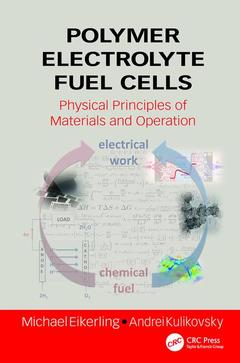Polymer Electrolyte Fuel Cells Physical Principles of Materials and Operation
Auteurs : Eikerling Michael, Kulikovsky Andrei

The book provides a systematic and profound account of scientific challenges in fuel cell research. The introductory chapters bring readers up to date on the urgency and implications of the global energy challenge, the prospects of electrochemical energy conversion technologies, and the thermodynamic and electrochemical principles underlying the operation of polymer electrolyte fuel cells. The book then presents the scientific challenges in fuel cell research as a systematic account of distinct components, length scales, physicochemical processes, and scientific disciplines.
The main part of the book focuses on theory and modeling. Theoretical tools and approaches, applied to fuel cell research, are presented in a self-contained manner. Chapters are arranged by different fuel cell materials and components, and sections advance through the hierarchy of scales, starting from molecular-level processes in proton-conducting media or electrocatalytic systems and ending with performance issues at the device level, including electrochemical performance, water management, durability, and analysis of failure mechanisms.
Throughout, the book gives numerous examples of formidable scientific challenges as well as of tools to facilitate materials design and development of diagnostic methods. It reveals reserves for performance improvements and uncovers misapprehensions in scientific understanding that have misled or may continue to mislead technological development. An indispensable resource for scientifically minded and practically oriented researchers, this book helps industry leaders to appreciate the contributions of fundamental research, and leaders of fundamental research to appreciate the needs of industry.
Introduction. Basic Concepts. Polymer Electrolyte Membranes. Catalyst Layer Structure and Operation. Modeling of Catalyst Layer Performance. Applications. Tables. Bibliography. Abbreviations. Index. Nomenclature.
Dr. Andrei Kulikovsky graduated from the Faculty of Theoretical and Experimental Physics of the Moscow Engineering–Physical Institute, one of the leading schools in physical sciences in the former USSR. In 1984, he obtained his PhD from the Institute for High Temperatures of the USSR Academy of Sciences. In 1998, he received the Doctor of Sciences (Research Professor) degree in physics and mathematics from the M.V. Lomonosov Moscow State University. While working in Russia, his main research interests were in the field of modeling of gas discharge plasmas. In 1998, Andrei moved to the Forschungszentrum Juelich (Research Centre Juelich), Germany, where Alexei Kornyshev engaged him into modeling of fuel cells, cell components, and stacks. Over the past 15 years, Andrei has published more than 80 research papers in high-ranked electrochemical journals; most of these papers have a sole author. In 2010, he published a book Analytical Modeling of Fuel Cells (Elsevier), which was the first monograph on theory and modeling of fuel cells. His current research interests include modeling of low-, intermediate-, and high-temperature fuel cells, catalyst layers, macroscopic modeling of aging processes and defects in cells, analytical study of the transport and kinetic processes in cells and stacks, and impedance spectroscopy of cells. Andrei’s work has always been focused on the development of simple analytical models, aiming at understanding the phenomena of interest.
Michael Eikerling is a professor of theoretical chemical physics and electrochemical materials science at Simon Fraser University in Burnaby, British Columbia, Canada. Over the past 10 years, he has also led activities in physical modeling of fuel cells at the National Research Council of Canada. Michael Eikerling received his diploma in theoretical condensed matter physics from RWTH Aachen (Germany) in 1995. He obtained his doctoral degree from the Technical University of Munich in 1999
Date de parution : 04-2017
15.6x23.4 cm
Date de parution : 11-2014
Ouvrage de 582 p.
15.6x23.4 cm
Thèmes de Polymer Electrolyte Fuel Cells :
Mots-clés :
Catalyst Layer; Proton Conductivity; Global Energy Challenge; Exchange Current Density; Principles of Electrochemical Energy Conversion; Cathode Cl; Fuel Cell Principle and Basic Layout; Cell Current Density; Theory and Modeling of Porous Electrodes; Fuel Cell; Framework of Catalyst Layer Performance Modeling; Proton Transport; Polarization Curve; Reaction Rate Distributions; CGMD Simulation; Current Density; Tafel Slope; DMFC Anode; Charge Transfer Resistivity; Nafion Content; Hydraulic Permeation; Heat Flux; AB INITIO; Proton Current; Water Sorption; Electro-osmotic Drag Coefficients; Net Water Flux; Impedance Spectra; Galvani Potential; Proton Mobility



